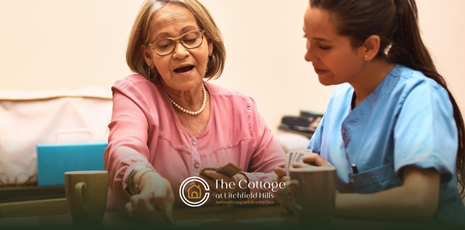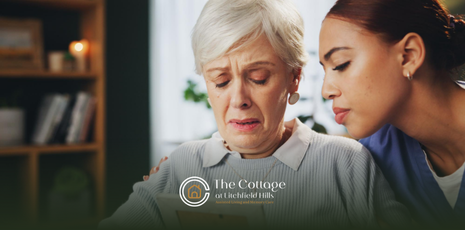How Assisted Living Promotes Independence, Not Dependence

For many families, the phrase “assisted living” brings to mind images of seniors losing control over their lives and becoming entirely dependent on others. In reality, modern assisted living communities are designed to do the opposite—they help residents maintain as much independence as possible while providing the right level of support.
This article will explain exactly how assisted living promotes independence, not dependence, and why it’s often the key to a happier, healthier, and more fulfilling life for older adults.
Understanding Assisted Living
Assisted living is a senior housing option that combines housing, personalized support services, and healthcare to meet the needs of older adults who may need help with daily activities but want to remain active and independent.
Unlike nursing homes, assisted living is not about round-the-clock medical care—it’s about giving residents just enough support to help them live life on their own terms.
Common services include:
- Assistance with activities of daily living (ADLs) such as bathing, dressing, and medication management
- Housekeeping and laundry services
- Nutritious meals served in a communal dining setting
- Social and recreational activities
- Transportation to appointments and outings
Why Independence Matters for Seniors
Remaining independent isn’t just a matter of pride—it’s deeply connected to overall health and well-being. Studies show that seniors who maintain autonomy experience:
- Better mental health: More control over daily decisions reduces anxiety and depression.
- Greater physical health: Staying active helps preserve mobility, strength, and balance.
- Higher self-esteem: Independence reinforces a sense of purpose and dignity.
- More social engagement: Seniors are more likely to participate in activities when they feel confident.
The Misconception: Assisted Living Equals Dependence
Many people assume that moving into assisted living means giving up freedom. This misconception often stems from outdated ideas about senior care, where residents had little say in their routines.
Today’s assisted living communities have shifted the focus toward personal choice, flexibility, and empowerment. Rather than “taking over,” staff work alongside residents to provide just the right amount of help.
How Assisted Living Encourages Independence
Below are the key ways assisted living promotes independence, not dependence.
1. Personalized Care Plans
- Care plans are tailored to each resident’s needs and abilities.
- Support can be adjusted as needs change—some residents may need only light assistance, while others benefit from more hands-on help.
Example: A resident might need help with medication reminders but can independently prepare their own morning coffee and choose their activities for the day.
2. Choice in Daily Routines
Residents decide when to wake up, what to wear, and how to spend their day. Flexibility is built into daily schedules.
This autonomy helps maintain a sense of control and dignity, which is vital for emotional well-being.
3. Encouragement of Self-Care
Rather than doing everything for residents, caregivers encourage them to perform tasks they are capable of doing.
Why it works: This approach prevents learned helplessness and keeps skills sharp for longer.
4. Accessible Living Spaces
Assisted living apartments are designed for ease and senior safety:
- Step-free entryways
- Walk-in showers with grab bars
- Emergency call systems
- Easy-to-reach storage
By removing environmental barriers, seniors can move around freely without constant assistance.
5. Opportunities for Social Engagement
Staying socially connected is a crucial part of independent living. Assisted living communities offer:
- Group outings
- Game nights
- Fitness classes
- Educational programs
These activities encourage residents to make choices about how they want to spend their free time.
6. Support with Transportation
Many seniors stop driving due to safety concerns, which can lead to isolation. Assisted living provides scheduled transportation for:
- Medical appointments
- Shopping trips
- Social events
This keeps residents active in their communities without relying entirely on family members.
7. Nutritious Dining Without the Burden
While meals are provided, residents are not restricted from preparing their own snacks or cooking if they wish. The dining service simply removes the stress of grocery shopping and meal preparation while still offering freedom of choice.
8. Wellness and Fitness Programs
Independence is easier to maintain with good physical health. Communities often offer:
- Gentle yoga
- Chair exercises
- Walking clubs
- Balance training
These programs support mobility and reduce the risk of falls.
Assisted Living vs. Total Care Dependency
| Feature | Assisted Living | Total Care Dependency |
|---|---|---|
| Level of Assistance | As needed, personalized | Constant, full assistance |
| Daily Routine | Flexible, resident-driven | Predetermined by staff |
| Decision-Making | Resident maintains control | Limited resident input |
| Physical Activity | Encouraged and supported | Often minimal |
| Social Opportunities | Abundant and varied | Limited or none |
The Psychological Benefit of “Just Enough” Help
A crucial aspect of assisted living is that help is given only when needed. This “just enough” approach prevents seniors from becoming overly reliant on caregivers.
When residents know support is available but not forced upon them, they feel empowered to do as much as possible on their own—boosting confidence and independence.
How Assisted Living Supports Changing Needs Without Loss of Freedom
One of the biggest fears seniors have is losing their independence entirely if their health changes. Assisted living solves this by offering scalable support.
- Early Stage: Minimal help with tasks, full independence in most areas.
- Later Stage: Increased support in specific areas while still promoting self-choice in others.
This adaptability means seniors can stay in one community longer without having to transition to a nursing home prematurely.
Family Peace of Mind Without Overstepping
For adult children, balancing care with respecting independence can be tricky. Assisted living bridges this gap by:
- Ensuring safety without micromanaging
- Allowing families to visit as loved ones, not caregivers
- Reducing family burnout while keeping seniors engaged
Real-Life Example of Independence in Assisted Living
Consider a resident who has mild arthritis. In their own home, they might struggle with heavy cleaning or standing for long periods in the kitchen. In assisted living, housekeeping and meal preparation are handled, but the resident still dresses themselves, chooses their schedule, and participates in gardening club—maintaining independence without the strain.
Signs It’s Time to Consider Assisted Living to Preserve Independence
- Increasing difficulty with home maintenance
- Missed medications or poor nutrition
- Isolation due to inability to drive
- Safety concerns like falls or difficulty using stairs
Moving into assisted living at the right time can actually extend the period of independence rather than shorten it.
Final Thoughts
Assisted living is not about taking away freedom—it’s about creating an environment where seniors can thrive safely while maintaining control over their own lives. With tailored support, engaging activities, and a strong emphasis on choice, residents enjoy both independence and peace of mind.
At The Cottage at Litchfield Hills, we believe independence is the cornerstone of dignity. Our compassionate team works alongside each resident to create a lifestyle that balances support with autonomy, ensuring they can live life their way for as long as possible. Reach out today!
Frequently Asked Questions
Does assisted living take away independence?
No. Assisted living is designed to provide just enough support so residents can continue living as independently as possible.
Can I choose my own daily schedule in assisted living?
Yes. Residents typically decide their own routines, including when to wake up, what activities to join, and what to eat.
Is assisted living only for people who can’t care for themselves?
No. Many residents are mostly independent but appreciate the convenience, safety, and social opportunities assisted living provides.
How is assisted living different from a nursing home?
Nursing homes focus on full-time medical care, while assisted living provides a more social, home-like environment with help only where needed.
Can I still have visitors in assisted living?
Yes. Most communities encourage family and friends to visit, and some even allow overnight stays with prior arrangement.
Sources:
- https://pmc.ncbi.nlm.nih.gov/articles/PMC11016145/
- https://www.hbrhc.com/
- https://www.healthinaging.org/tools-and-tips/tip-sheet-home-safety-tips-older-adults
- https://www.ncoa.org/article/exercise-programs-that-promote-senior-fitness/
- https://www.mayoclinic.org/diseases-conditions/arthritis/in-depth/arthritis/art-20046440






